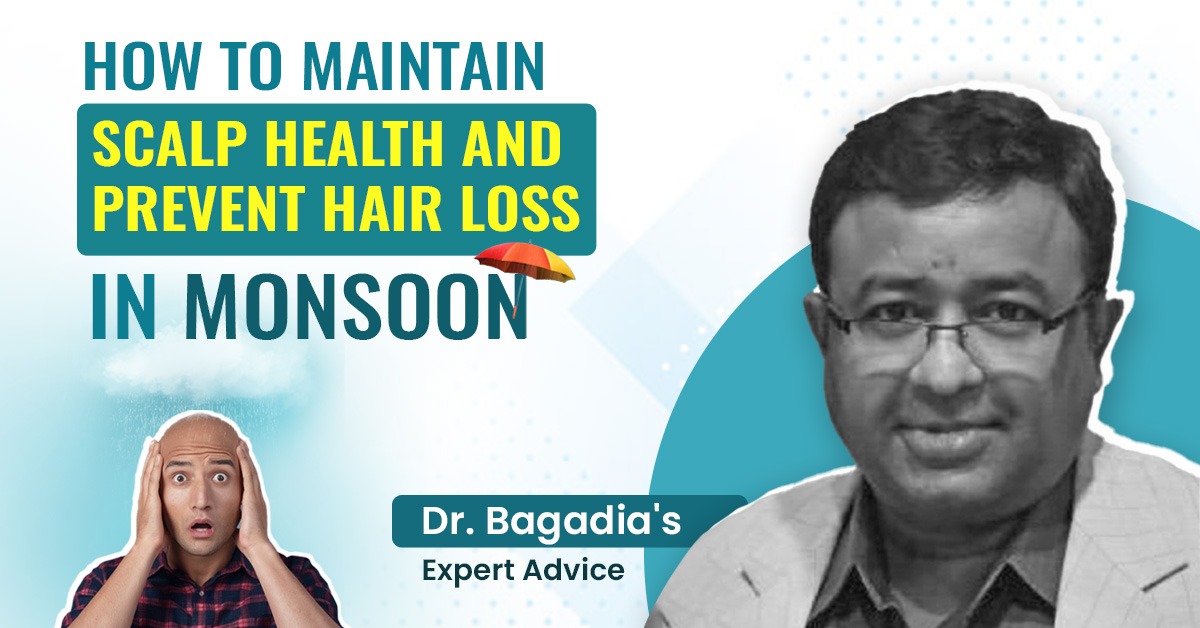Scalp issues and hair loss are common among many people as monsoon arrives and humidity increases. Studies indicate that during the monsoon, up to 60% of individuals have increased hairfall in monsoon. The high humidity levels cause more noticeable hair loss in monsoon season because they provide a perfect breeding ground for scalp problems and damage the hair follicles.
“Creating a balanced scalp environment lies in creating a key to healthy hair during the monsoon,” says Dr.Bagadia. Here is how you go do it:
Keep Cleanliness: Maintaining cleanliness of your scalp is one of the most important things. Dr. Bagadia recommends routinely washing your hair with a mild, sulfate-free shampoo to get rid of extra perspiration, debris, and oil. “In the monsoon, wash your hair every one or two days. Strong shampoos should be avoided since they might deplete the scalp of natural oils, which would make it dry and irritated,” he says.
Use Antifungal Treatments: As humidity levels increase, fungal infections become more frequent, which is why hair loss in monsoon is so common. Using shampoos that include zinc pyrithione or ketoconazole, which help to cure and prevent fungal infections. “These ingredients help to keep the scalp free from infections, thereby reducing hair fall significantly,” he said.
Drying Techniques: Make sure your hair is dried properly after washing it. Leaving hair wet might encourage the growth of fungus and harm the strands itself. “To dry your hair, use a microfiber towel; avoid rubbing too hard, as this can break it,” advises Dr. Bagadia.
Sustaining scalp health requires a well-balanced diet and enough of water. Check that you are getting enough protein, omega-3 fatty acids, zinc, and vitamins A, C, D, and E. As Dr.Bagadia notes, “Nutritional deficiencies may exacerbate hair loss. Good nutrition and enough of water intake will help the scalp and hair growth.”
Avoid Using Heavy Hair Products: Avoid using heavy styling products that might weigh down and pile your hair during the monsoon. Pick mild, non-greasy items instead. “Neem, tea tree oil, and aloe vera-containing products can be especially helpful,” says Dr.Bagadia.
Pro Advice for Healthy Scalps
According to new studies, scalp issues may increase by up to 30% during the rainy season. Dr.Bagadia stresses that using a few cutting-edge methods might have a big impact:
- Regular exfoliation of the scalp may help remove dead skin cells and increase blood flow. Try a little scrape once a week.
- Essential Oils To improve scalp health and slow down hair loss, massage your scalp with essential oils like lavender or rosemary. Dr. Bagadia says, “Studies have indicated that rosemary oil can be as effective as minoxidil in promoting hair growth.”
- Probiotics Good scalp health has been linked to a healthy gut flora. Probiotics in your diet might help to preserve the environment of your scalp.
With the expert advice of Dr.Bagadia, you may weather the rainy season without compromising the health or vigour of your hair or scalp. From understanding the effects of humidity to putting advanced care techniques into practice, these insights will give you the knowledge you need to maintain gorgeous hair even in the worst of conditions.
👉 Click here to read the latest Gujarat news on TheLiveAhmedabad.com





